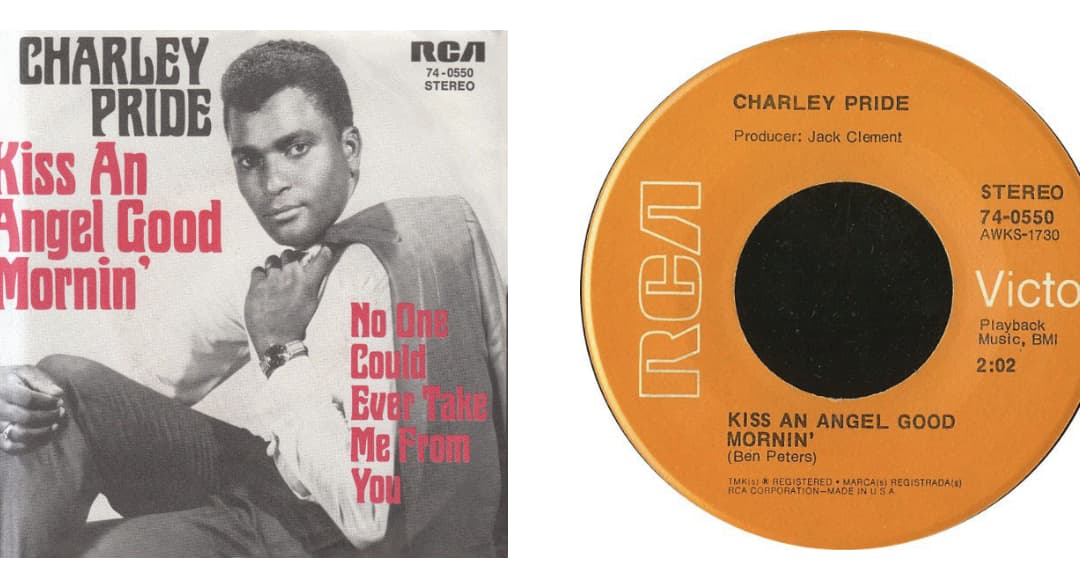
A plain, sweet line about a kiss turned into the signature that defined Charley Pride’s career and broke country music into new territory. “Kiss An Angel Good Mornin’” arrived as a small country song and left as a cultural touchstone.
Written by Ben Peters and guided into life by producer Jack Clement, the song was released in the early 1970s and quickly became Pride’s best-known recording. The tune rose to the top of the country charts, crossed into the pop world and spent months on both charts. For older listeners it became an unmistakable sound of the decade — simple, warm and stubbornly memorable.
Ben Peters, the songwriter, kept the lines plain and direct. He wanted a lyric that married faith and gratitude with the everyday intimacy of marriage. The result was a chorus that millions of radio listeners whistled along to, in cars and at kitchen tables.
Ben Peters, songwriter: “I wrote a little song about thankfulness. It was never meant to be a grand statement — just a short, honest line that people could sing back.”
Pride’s recording, produced by Jack Clement, proved to be a defining performance. It became his eighth No. 1 on the country charts and his first single to make a serious dent on the pop charts, ultimately peaking well inside the mainstream Hot 100. The single lingered on the airwaves for roughly four months across both country and pop listings, and later earned a place among the decade’s most-played songs on industry tallies.
The song also carried awards recognition. It took home the Grammy for Best Country Song in the early 1970s, and Pride himself was acknowledged for his vocal work tied to the album that carried the track. Though another hit edged out Pride for a vocal award at one ceremony, the song’s broader cultural reach was unmistakable.
Family and colleagues say the song became more than a hit; it became a family legacy and a bridge to new audiences. The tune opened doors for Pride at a time when country music still felt like a narrow world. Its gentle message and Pride’s warm baritone brought him listeners who might otherwise never have tuned in.
Dion Pride, son and musician: “That song changed everything for our family. People who’d never heard a country record knew Dad from that line. It made him a neighbor in living rooms across the country.”
Beyond the charts and trophies, the song is credited with changing how audiences saw Pride as an artist. For some older fans, it is the song they hear first when his name is spoken. Industry lists later ranked the track among the most-played of the decade, a sign of its persistent replay on radio and in jukeboxes.
Pride continued to carry the song through later stages of his career. He revisited it on major stages and award shows, and the track followed him into honors that recognized his lifetime contribution to music. For many, the song remains a touchstone — proof that a straightforward country melody can cross lines and calm a restless room.
The recording itself is spare and effective: a warm lead vocal, a steady country arrangement and a singable chorus that asks listeners to put love and gratitude first. Jack Clement’s production avoided flash. It let Pride’s voice do the work, and it let Peters’ words land with the plain power of a homespun blessing.
Numbers underline that reach: a sit at the top of country charts, a crossover into the broader Hot 100 where it climbed well into the top half, months of steady chart life and later recognition on decade-end playlists. For older audiences who remember the song on the radio, it did more than entertain — it anchored evenings and became part of daily routine, the kind of song people hummed while making coffee or fixing a porch step.
Even as newer generations discovered Pride through anthologies and tribute sets, the track kept its place as a signal song — the one that told listeners who Charley Pride was and what he stood for. Its rise from a simple lyric to a national refrain remains a striking chapter in country music history, a moment when a single, modest idea connected with millions and carried a voice further than anyone had expected —